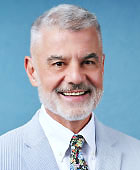My Presidential Theme Is Concluding but Far From Ending

Over the past year, my presidential theme has been “Confronting Addiction From Prevention to Recovery.” This initiative has focused on four of the biggest areas in addiction medicine—three persistent and one emerging: vaping and tobacco, opioids, alcohol, and technological addictions. Each of these issues has been addressed in quarterly educational campaigns in which expert members of APA have created resources aimed at the general public and physicians alike.
The members of the presidential initiative working group have done a fantastic job in framing the four topic areas in informative and relatable ways. The working group is led by Smita Das, M.D., Ph.D., M.P.H., chair of the APA Council on Addiction Psychiatry, and includes council members Tauheed Zaman, M.D. (tobacco/vaping), Lief Fenno, M.D., Ph.D. (opioids), and Jeremy Kidd, M.D. (alcohol) and APA member James Sherer, M.D. (technology). Their expertise and enthusiasm for this initiative have been invaluable and are a huge reason why we have been so successful in disseminating evidence-based messages.
To date, we have released more than 80 work products supporting each of the four campaigns encompassing webpages on Psychiatry.org, blogs, webinars, op-eds in major news publications, social media events, animated explainer videos, special reports in Psychiatric News, and more. Most of these are available in both English and Spanish, ensuring that a wide swath of the population are able to read and relate to evidence-based information on substance use disorders (SUDs) and the behavioral addictions.
One project of which I am particularly proud is a pair of educational resources highlighting what physicians and the public should know about addiction. The Top Ten Things Everyone Should Know About Addiction and Top Ten Things Every Physician Should Know About Addiction are a product of collaboration between APA and the American Society of Addiction Medicine, as well as our partners at the American Academy of Addiction Psychiatry and the American Association of Family Physicians.
At press time, the Top 10 campaigns and other resources, along with the newswire releases promoting them, had gotten approximately 3.8 billion impressions, representing a vast audience. This is a massive amount of visibility for resources that reflect what psychiatrists and others who work in the mental health field do daily to confront addiction, all with the core messages that substance use disorders are treatable, that recovery is possible, and that treatment works when patients can access it.
Collaboration among professions and open exchange of ideas are essential components of our work on addiction. I am delighted to see how enthusiastically our colleagues at these allied organizations have responded to requests to share knowledge and resources. The convening of allied organizations in the summer of 2023 was a great example of this collaboration and led directly to the creation of the “Top 10 Things” and the repository of SUD resources that are easily accessible.
This is my 12th and final presidential column in Psychiatric News. What an incredible year it has been! From testifying and advocating to Congress to presenting and collaborating with colleagues around the world, I have had a once-in-a-lifetime experience. The work we have done will continue beyond my presidency. Together, our knowledge, compassion, and spirit will continue to advance people’s mental health and well-being and help humanity flourish. ■



